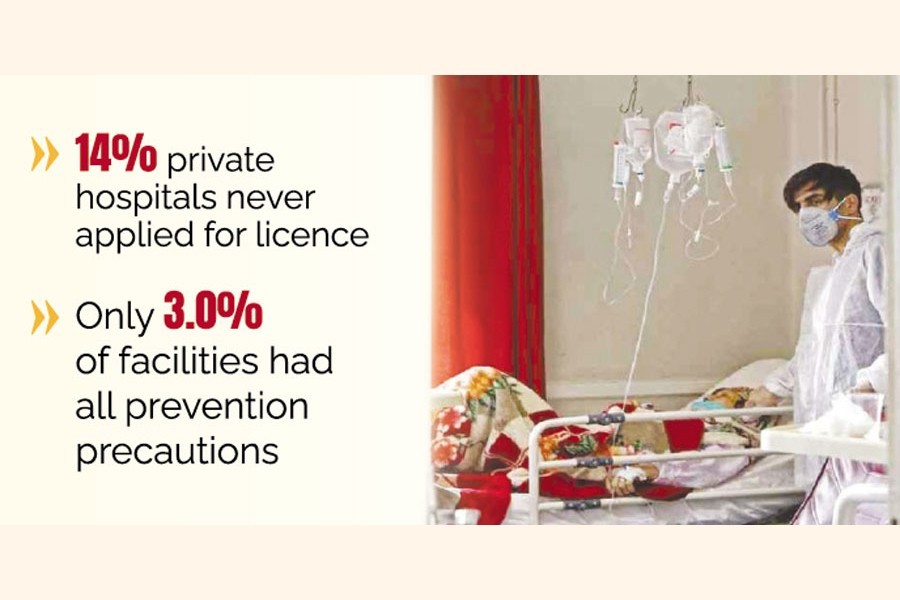Nearly 94 per cent of the country's private sector healthcare facilities were found running in an unauthorised and non-compliant way, indicating little regulations in the health sector, according to a latest study.
The survey -- conducted by the International Centre for Diarrhoeal Disease Research, Bangladesh (icddr,b) -- also found that only 6.0 per cent of the private healthcare facilities had valid licences, while 59 per cent applied for new licences or renewal of the old ones.
To this effect, it also suggested revising and approving the 2016 draft guidelines, which added rules and procedures to the Medical Practice and Private Clinics and Laboratories (Regulation) Ordinance 1982.
icddr,b and Data for Impact (D4I) jointly disclosed the study findings at a seminar at icddr,b headquarters in the capital that discussed licensing challenges in private healthcare facilities in Bangladesh.
The findings were presented by Dr. Shams El Arifeen, Chief of Party, Research for Decision Makers Activity, and Senior Director, MCHD, icddr,b.
Since the 1980s, the private sector's share in healthcare services has grown rapidly, including maternal and newborn health (MNH) services. Currently, about 80 per cent of the hospitals in Bangladesh are private facilities.
This study was conducted in the year 2019-20. However, the situation may change this time, according to icddr,b.
It was conducted in 12 city corporations and 29 upazilas of 10 randomly selected districts across the country. About two-thirds of the private facilities were in city corporations areas, while about one-third in municipalities.
A total of 1,117 facilities were provided licensing status during the survey period.
Terming that there were several challenges in the licensing process, the study said the 1982 ordinance does not specify a validity period, or penalties for delays.
Facility owners also highlighted their reasons for licensing delays, including short validity of licence, requirement of multiple clearances from authorities, limited technical capacity of smaller facilities to process applications, long waiting time for application approval, and lack of feedback on application submission.
High licensing fees are the most challenging one for small clinics, it also found.
Based on the findings, many steps were taken by the Hospital Services Management (HSM) unit of the Directorate General of Health Services (DGHS).
Dr. Supriya Sarker, Programme Manager of HSM, DGHS, presented the steps taken by the DGHS based on the findings.
Dr. Sheikh Dawud Adnan, Deputy Director (Hospital) of HSM, DGHS, shared the future initiatives of the unit in this regard.
The 1982 ordinance outlined seven mandatory conditions to provide licence to private facilities.
Nearly 90 per cent of the facilities assessed met three of these conditions: adequate floor space for each patient, air-conditioned operating theatre, and availability of at least one specialist, the study stated.
However, there were poor compliances regarding some of the conditions -- identified partly due to unclear definitions and rules when assessed against standardised measures.
Compliances against some mandatory conditions, such as infection control, essential equipment, and medicine, were found to be of poor standard, it noted.
Additionally, there were variations in availability of documents, necessary to obtain licence.
Facility owners highlighted that tax certificates (86 per cent) and VAT certificates (58 per cent) were widely available across small and large facilities.
Environmental clearance certificates (32 per cent) and narcotic licences (25 per cent) were reported to be difficult to obtain, and smaller facilities had greater difficulties in obtaining both.
The DGHS should coordinate and organise dialogues with different government departments to overcome the situation, it recommended.


